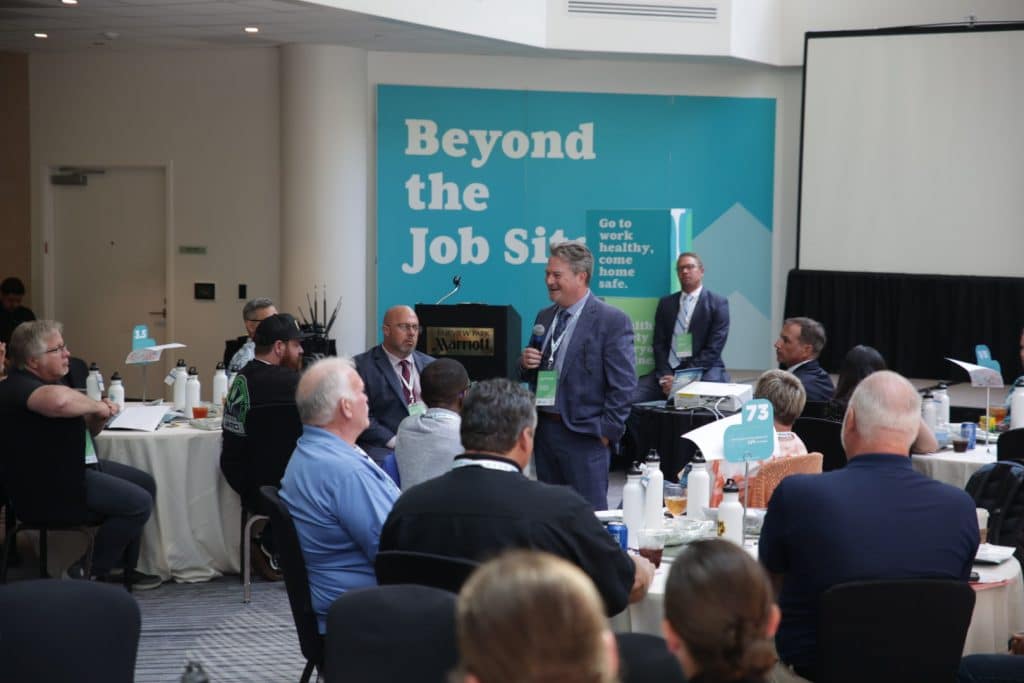
The Centers for Disease Control (CDC) reports that construction is second only to mining when it comes to suicide rates in American professions. According to a 2020 survey, 83% of construction workers said they had struggled with mental health issues. And data from the National Survey on Drug Use conducted by the Substance Abuse and Mental Health Administration found that 12% of construction workers have an alcohol abuse disorder, compared with the national average of 7.5%.
For all those reasons — and as part of our union’s core values of solidarity and safety — SMART and the Sheet Metal Occupational Health Institute Trust (SMOHIT) started the SMART Member Assistance Program (MAP) approximately 10 years ago.
“SMART MAP is a program that focuses on mental health,” explained SMART Director of Wellness and Mental Health Support Chris Carlough. “We do some awareness training around … anxiety, depression or substance use, suicide prevention, things like that. And we talk about resources, we help our local unions find resources for their members. And on the back end, we develop and train peer mentors to help support all the members and families that are going through crisis.”
By training union workers to be peer mentors for their fellow brothers and sisters, the program aims to raise awareness, reduce the stigma surrounding mental wellness and create a self-sustaining mental health support system within our union, helping to ensure members have somebody to lean on. Not only that – the three-hour SMART MAP sessions provide members with an avenue to open up about their own experiences.
“One of the things that really strikes me is how our members really want to talk about this,” Carlough pointed out.
In addition to SMART MAP, members also have access to an employee assistance program called Union EAP, founded by SMART MAP consultant and subject matter expert Ben Cort.
“[Union EAP] is based on a premise that our members are asked to do way too much when they’re in a time of crisis: You make a phone call, and you basically end up getting a list back of a bunch of different places that you can call if you want to,” Cort said. “The idea that we had with this was much more of a concierge kind of mental health service. You call, you speak to a clinician, that clinician does a full assessment, understands what’s going on, and then builds an individualized and personal plan for you and for your family. And then we see you through all of it.”
Alongside Carlough – and as part of his work with the SMOHIT helpline, which provides a resource for members to call when they need assistance – Cort has been taking phone calls from members for the last five or six years, helping direct them to resources and work their way through mental health crises. He said that aspect of his profession is “one of the coolest and most rewarding things in my entire career.”
The work done by Carlough and Cort – as well as other professionals throughout SMART and SMOHIT – is all part of fostering a union-wide environment that helps SMART members feel comfortable talking about mental health and seeking help when they need it. The more we can provide those union mental health programs, Carlough maintained, the better we will be able to keep our fellow union workers healthy and safe.
“We don’t necessarily want to talk about it on the jobsite, but when we’re given a safe space to be able to talk a little bit about it, we have our members really opening up on how they’re feeling. How they’re dealing with divorce, for example, what they’re struggling with — whether it’s mental health, substance use,” he said. “We’ve had members express that they have suicidal ideations — and we [can support] them. We have these moments in these trainings [when] I really feel like our union is light years ahead of other building trade unions in this.”
Related News
- Kansas funds passenger rail expansion
- SMART’s General President Defends Our Brother
- Maryland Passes Monumental Transit Safety Bill
- Brother Wirth Crowned Champion in 168-Pound Masters Division Victory
- Chairman Pauli Announces Retirement, SMART-TD celebrates his career
- SMART statement on Supreme Court’s decision regarding Kilmar Armando Abrego Garcia’s return to the United States
- SMART-TD Stands With Brother Kilmar Abrego Garcia
- New Mexico Local 1687 sets new precedent with Red Apple Transit
- Tentative Agreement Reached With TransitAmerica Services (TASI)
- SMART issues Monday, April 7, statement on Kilmar Armando Abrego Garcia’s ongoing case